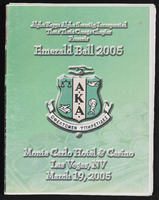Search the Special Collections and Archives Portal
Search Results

Emerald Ball (Monte Carlo Hotel)
Date
Archival Collection
Description
From the Alpha Kappa Alpha Sorority, Incorporated, Theta Theta Omega Chapter Records (MS-01014) -- Ivy Leaf magazines and event souvenir programs file.
Text

Craig Galati Interview, October 24, 2016: transcript
Date
Archival Collection
Description
always thought I'd be more urban. I would live in a downtown city. I wouldn't have a car. I would walk around. I would work on these big skyscrapers.” At one point in his life, architect Craig Galati dreamt of designing large buildings in some of the nation’s biggest cities. Instead, he was drawn back to his childhood home of Las Vegas, where he created projects meant to preserve the city’s integrity, such as the Grant Sawyer State Office Building and the first building at the College of Southern Nevada Charleston Campus. He speaks to his work in preservation at the Las Vegas Springs Preserve and in welcoming visitors to Mount Charleston with his Spring Mountains Visitor Gateway design. In this interview, Galati talks about his parents’ decision to move from Ohio to Nevada and what it was like growing up in Las Vegas. He recalls his first teenage jobs in the Las Vegas of his youth and his studies in architecture at the University of Idaho. He recounts the dilemma of struggling to find architecture work he enjoyed and how that vision drew him back to Vegas. He describes various projects in his portfolio from his early years to the present. He speaks highly of his partnership with Ray Lucchesi and the basis for their vision: “We wanted to be a place that everybody liked to work for. Buildings were just tools to do something grander. They weren't an object. We had a philosophy that was not object based, it was people based.”
Text

Transcript of interview with Frankie Perez by Elsa Lopez and Laurents Bañuelos-Benitez, November 5, 2018
Date
Archival Collection
Description
Frankie Perez (1986- ) is an individual that constantly found himself navigating two worlds, whether it was military versus civilian; female versus male; or being Latinx in the United States. As a result of this navigation, Perez has a unique perspective on our ever more complicated world that not many individuals possess. Perez served in the military during the Do Not Ask, Do Not Tell policy which made it difficult for someone dealing with gender identity, to seek out the proper support they need. Despite the policy, and other policies that were put in place afterwards to inhibit the transgender community in the military, Perez began his transition while still serving his country. In direct contradiction of popular opinion, Perez discovered that the military easily accommodated his transition. Outside of the military Perez is an active voice in the LGBTQ community. As a member of the LGBTQ, Latinx, and military community, Perez has a unique perspective that he uses to fight for both LGBTQ and Latinx rights. Currently, Perez is finishing his degree in gender and sexuality studies at UNLV. He hopes to use his education to help people have the difficult discussions and improve conditions for his communities.
Text

Transcript of interview with Randy Garcia by Laurents Bañuelos-Benitez, November 27, 2018
Date
Archival Collection
Description
Randy Garcia is the founder and CEO of the investment management-consulting firm, The Investment Counsel Company. Born in Los Angeles on Feb. 21, 1954, Garcia’s family moved to Las Vegas in 1957. The son of a World War II vet and a homemaker, Garcia’s ancestral roots come from Mexico, Italy, and Spain. He grew up in Las Vegas during segregation and expansion. He remembers a time when much of city included dirt lots and casinos that no longer stand. A champion in serving under privileged youth and communities across southern Nevada, Garcia lives by the philosophy, “give until it hurts.” Garcia uses his success as a wealth manager to promote, foster, and cultivate positive change for the Latinx community in Las Vegas. His story and dedication to his community is a pinnacle of hope and benevolence for current and future generations. Garcia became the first in his family to attend and graduate college. He graduated from UNLV in 1977 with honors, where he majored in business administratio
Text

Autumn Keyes Ita interview, February 26, 1980: transcript
Date
Archival Collection
Description
From the Ralph Roske Oral History Project on Early Las Vegas, OH-01017. On February 26, 1980, collector Steven McKenzy interviewed Clark County Community College coordinator of rehabilitation, Autumn Keyes Ita (born December 8th, 1936 in Port-au-Prince, Haiti) at the Clark County Community College. This interview offers a personal historical account on home and family life in Las Vegas, Nevada. Autumn also discusses entertainers such as Wayne Newton and Sammy Davis, Jr., and the role that entertainment played in the development of Southern Nevada.
Text

Transcript of interview with Alice Doolittle by Christopher Moran, March 21, 1977
Date
Archival Collection
Description
On March 21, 1977, Christopher Moran interviewed Alice Doolittle (born 1897 in Boston, Massachusetts) about her experiences while living in Nevada. Also present during the interview is Ruth Belding, Alice’s daughter. Doolittle first talks about her reasons for coming to Las Vegas and her eventual occupation as a dental assistant. She also talks about her family’s history of living on the Stewart Ranch and the ranch’s swimming pool that attracted many during the summers of Las Vegas. Doolittle also describes her move to Boulder City with her husband, the first theaters in Las Vegas, and the Union Pacific Railroad. At the end of the interview, the three discuss Helen Stewart, Harley Harmon, and the Doolittle Center, named after Doolittle’s late husband, Ferris Doolittle.
Text

Transcript of interview with Wayne Earl by Diane Donovan, March 14, 1981
Date
Archival Collection
Description
On March, 14, 1981, collector Diane Donavan interviewed her neighbor, pharmacist Wayne Earl (born June 21, 1926 in St. George, Utah) at the collector’s home in Las Vegas, Nevada. This interview covers Earl’s early recollections of Nevada and his life after moving to Las Vegas in 1940. Earl also talks about World War II, McCarran Airport, Nellis Air Force Base, North Las Vegas politics, Jaycees, and the Chamber of Commerce. Additionally, Earl recalls his involvement in civic affairs, social and religious activities, including his affiliation with the Mormon Church.
Text

Jack Howard interview, February 27, 1977: transcript
Date
Archival Collection
Description
From the Ralph Roske Oral History Project on Early Las Vegas collection OH-00897. On February 27, 1977, collector Michael K. Ericksen interviewed his uncle, schoolteacher, Jack E. Howard, (born June 18th, 1920 in Dewey, Oklahoma) in his home in Overton, Nevada. This interview covers Mr. Howard’s personal experiences and recollections about Southern Nevada. Mr. Howard’s wife, Mrs. Helen Howard, is also present during this interview, which offers a thirty year local overview.
Text

Transcript of interview with Oscar Goodman by Claytee D. White November 10, 2014
Date
Archival Collection
Description
Oscar Baylin Goodman (1939- ) is the former mayor of the city of Las Vegas, Nevada, serving 12 years until 2011, when he swore in his wife of over 50 years, Carolyn Goodman. Oscar Goodman is the official ambassador of Las Vegas, and the chairman of the Las Vegas Convention and Visitors Authority (LVCVA) Host Committee. He is also known as one of the best criminal defense attorneys in the United States, and spent 35 years defending alleged Mob figures such as Meyer Lansky, Frank Rosenthal, and Anthony Spilotro. Goodman is the primary visionary and a member of the board of directors of The Mob Museum in downtown Las Vegas, which opened in 2012. Goodman was born June 26, 1939 in Philadelphia, Pennsylvania. He earned his undergraduate degree from Haverford College in 1961 and his law degree from the University of Pennsylvania Law School in 1964. That same year he moved to Las Vegas and in 1965 he was admitted to the Nevada State Bar. He served as Clark County?s chief deputy public defender from 1966 to 1967. Goodman was elected as mayor of Las Vegas for the first time in 1999. During his three terms (the legal limit), he contributed to the economic and cultural development of the downtown area by supporting projects such as the arts district and Union Park, a high-rise residential and business project he helped to secure 61 acres of land for. He helped to begin what he called the ?Manhattanization? of downtown, which included the construction of taller buildings for better use of the area?s prime real estate. In this interview, Goodman discusses the role of Judaism in his life, from childhood to adulthood to parenting his own four children. He touches on his involvement with Temple Beth Sholom, including serving as its president, as well as in local development projects like the Lou Ruvo Cleveland Clinic Brain Health Center, Smith Center for the Performing Arts, and Mob Museum. In addition, Goodman discusses the impact of Jewish residents on the city and its development, and mentions leaders in the gaming industry, legal profession and in politics.
Text

Transcript of interviews with Louis Wiener, Jr. by Eleanor Johnson, January-February, 1990
Date
Archival Collection
Description
In this multi-part interview, Louis Wiener, Jr. discusses coming to Las Vegas from Pittsburgh at a young age, attending Las Vegas High School and University of Nevada Reno. He attended law school at University of California at Berkeley and passed the Nevada State Bar in 1941. He established a practice, Jones, Wiener and Jones, with Bob Jones and Cliff Jones and later with Herb Jones. He had another practice with Neil Galatz and Dave Goldwater, retiring in 1988. Wiener had other business ventures that allowed him to do pro bono work as a lawyer. Wiener discusses his family, including former spouses, his children, and various aspects of his career as an attorney in Las Vegas, representing hotels in the Greenspun antitrust lawsuit, and as an attorney for Bugsy Siegel. He says of his success, "I'm just lucky. I was here at the right time and I picked the right people to help."
Text
